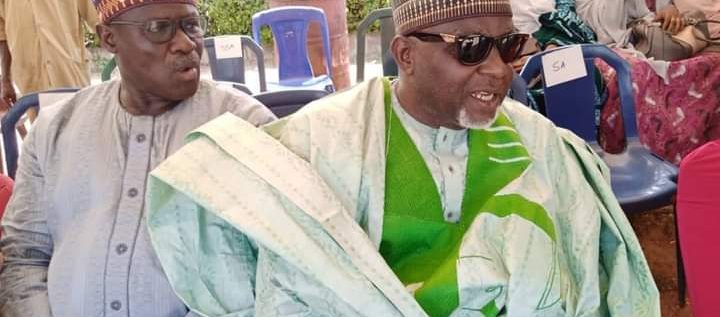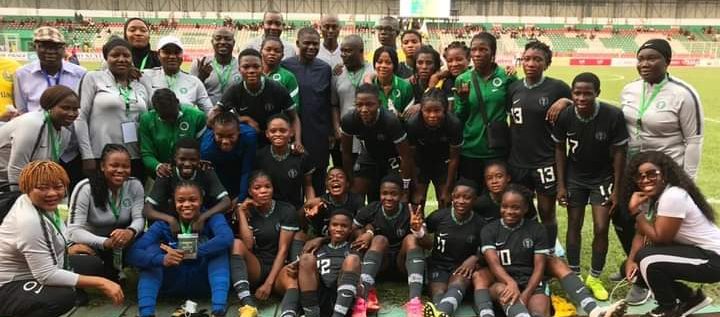How Foreign Coaches Are Underdeveloping Africa Football

1,590 total views, 3 views today
The July 19 finals of the 2019 African Cup of Nations (AFCON) in Egypt was a kind to go down in the memories of the football-loving fans across Africa. While in the area of individual match-ups, it was tipped as a final between two football stars – Sadio Mane of Senegal and Riyad Mahrez of Algeria – as some people even extended it to their respective clubs: Liverpool vs. Manchester City. But then, there was more to it than that.
The AFCON 2019 was the first time local coaches guided their teams to the final since the 1998 edition when Egypt beat South Africa 2-0 in the final.

Algeria coach, Djamel Belmadi and Senegal’s Aliou Cisse have a lot in common. Having captained their nations as footballers – with the latter (Aliou Cisse) guiding the Lions of Teranga to the 2002 final where they lost to Cameroon in the final, the two men were in the dugout for their respective countries as Algeria and Senegal battled it out for Africa’s most prestigious trophy – which, of course, Algeria claimed with a 1-0 scoreline.
The first-ever final between local coaches was in 1962 when hosts Ethiopia coached by legend Yidnekatchew Tessema won their first (and only to date) AFCON title, defeating Egypt 4-2 in the final. The Pharaohs were then coached by the duo of Mohamed El Guindy and Hanafy Bastan.
Three years later – 1965, another final between local coaches was staged as Ghana coach Charles Gyamfi had his second successive AFCON glory then, bettering Tunisian counterpart Mokhtar Ben Nacef 3-2 in the final. Ghana have had the joint-most wins by local coaches as in 1978 Fred Ousam-Duodu beat Uganda led by Pete Okee 2-0 in the final.
The last final came in 1998 when Egyptian Mahmoud El Gohary became the first man to win AFCON as a player (1959) and coach. He guided the Pharaohs to their fourth title in Burkina Faso, defeating South Africa, coached by local icon Jomo Sono by a 2-0 scoreline in the final.
Overall, 12 local coaches have won 16 AFCON titles in the previous 31 editions. Ghana’s Gyamfi and Egypt’s Hassan Shehata had each won record three titles, with Algeria’s Djamel Belmadi the latest to add his name on the list of African coaches to have won it
List of Local Coaches to Win AFCON Titles:
Mourad Fahmy (Egypt – 1959)
Yidnekatchew Tessema (Ethiopia – 1962)
Charles Gyamfi (Ghana – 1963, 1965 and 1982)
Adolphe Bibanzoulo (Congo – 1972)
Fred Osam-Duodu (Ghana – 1978)
Abdelhamid Kermali (Algeria – 1990)
Yeo Martial (Cote d’Ivoire – 1992)
Clive Barker (South Africa – 1996)
Mahmoud El Gohary (Egypt – 1998)
Hassan Shehata (Egypt – 2006, 2008 and 2010)
Stephen Keshi (Nigeria – 2013)
Djamel Belmadi (Algeria – 2019)
The Radical Changeover

African football seems to be following the path of its national economies: so much resources and human talent but always looking to the West for help. Even though Africa has a massive pool of footballing talents in the top leagues in Europe, it is not unusual for football federations across Africa to seek management outside the continent.
African Football Associations still see foreign coaches above African coaches, and are happy to pay them a far higher salary. Yes, familiarity breeds contempt – and this is particularly true of Africa – but it is also the only continent that fails to recognise and exploit its vast footballing expertise for its own benefit. It is a habit for them to put trust in foreigners over locals – and this is why you won’t be surprised we still had all-foreign coaches AFCON final as recent as 2017 when Egypt’s Hector Cuper faced Hugo Broos’ Cameroon in Gabon.
After a turbulent period which saw Algeria employ seven coaches in three years, it has taken Djamel Belmadi less than one year to restore order and turn a dispirited squad into champions at the 2019 Africa Cup of Nations. Although he had only coached in Qatar before taking the job, Belmadi has lifted the “Desert Foxes” out of their ruins and turned them into winners – yet as a local manager.
“It’s a great message that we have sent to those responsible for football in all countries in Africa, it’s amazing,” Belmadi told the media after winning AFCON 2019. Of course, they have passed a great message across and it should spur a rethink among African football governing bodies – as there is definitely a case for keeping it domestic when it comes to national teams – no foreigner has ever won the World Cup for another country in history.
When Germany announced Joachim Low would keep his job despite a disastrous World Cup campaign in 2018, you could only wish African Football Associations would borrow a leaf out of that book.
Still at Russia 2018 World Cup, Europe and South America, the two best footballing continents by far, had 19 countries participating at the World Cup. All 19 of the teams were managed by coaches from the same continent. 15 of the 19 teams were managed by coaches from the same nations. Furthermore, of the four managers who were not from the nations, three of those four speak the same language that is spoken in the nation that they manage.
In comparison to Africa, there were FIVE teams that represented the continent in Russia; just two of them were managed by local coaches. The other THREE are from a different continent; Hector Cuper, Herve Renard and Gernot Rohr – who managed Egypt, Morocco and Nigeria respectively. Yes, they speak a different language entirely, but that wouldn’t stop African FAs from trusting them with their nations.
Former Malawi national football team coach Kinnah Phiri once asserted that “it’s not fair for us African coaches not to be given a chance to run our own national teams because in the first place most of us are well trained, I trained in Britain; so to me, I think it’s just because of our own mentality as Africans that we do not believe in our people.”
Meanwhile, Malawi have never qualified for the World Cup. However, they have twice qualified for AFCON – in 1984 and 2010. Local coaches had been in charge on both occasions: the late Henry Moyo in 1984 and Phiri in 2010.
Why Foreign Coaches Over Locals?

There have not been many (if any) African dynasties in which a national team was able to have consistent international and continental success over a prolonged period. The closest African football has come to having a dynasty was the Egyptian team from 2006-2010. But even then, they still failed to make the World Cup in 2010. Qualifying for the World Cup has been the base achievement for a successful African team, as knockout round success in the World Cup for African teams is not a thing to come by often.
The last African nation to make it beyond the round of 16 was Ghana. They had a quarter-final appearance but Luis Suarez’s infamous handball made it impossible for an African side to record the first ever semi-final appearance at the FIFA’s global football event.
Due to the temporary nature of success in African football; poor local leagues and inadequate infrastructural facilities, federations tend to look for quick, short-term success; and they find this most often in European or South American managers. Because of the high pedigree associated with European and South American football, these foreign managers are seen as being at a higher level than local African coaches. Desperate for immediate success, African football federations will hire foreign managers, achieve momentary success, and go back to square one. They leave their underdeveloped local leagues rotten, limiting opportunities for the indigenes to make a difference when, in actual sense, these indigenes know their own problem more than any foreigner.
Furthermore, there is a substantial difference in the way that local and foreign coaches are treated by football associations across Africa. In 2013, late Nigeria coach Stephen Keshi was also critical of the attitude taken by some of the continent’s governing bodies when it comes to treating local coaches and foreign ones.
“African coaches – when federations employ them, the federations want them to win the World Cup, the Africa Cup of Nations and every game,” said a man who led Nigeria to AFCON glory both as a player and coach.
“Meanwhile, if they give a white person the same job, they tell the white person he needs one year to adapt, to know the country and the players – they are told ‘don’t worry, take your time’.”
Truth be told, that is unprofessional and is one thing that is killing African football. Why give privileges to a foreigner who is coming in to fix your problems on short-term while neglecting the long-term goals?
African Football Future Not In Foreign Coaches
Given the quality of players, and the continent’s love for football; there are ways to put Africa quite close to the level that European and South American football is. Hiring and trusting local managers is a start. Federations need to have a rethink, by giving local managers a guaranteed job security over a long period. There is a high possibility that it leads to the national teams having long term consistent success, and this will definitely create a successful system throughout the football pyramid in the nation.
Aliou Cisse has only been with the Senegalese national team since 2015 and he has already made marks several preceding foreign coaches could not achieve for the West African country. He led Senegal to 2018 World Cup and almost qualified for the knockout round but yellow card accumulation denied them that feat.
“I feel very proud. We haven’t reached the final since 17 years. This is the fruit of a long time preparation. Those players have worked hard and now we get the fruit of this hard work.
“My relationship with them is like father-sons one. When I became their coach in 2015 I told them our target is to reach the FIFA World Cup and the Africa Cup of Nations final. That was the way to convince Kalidou Koulibaly to play for Senegal instead of France. Now here we are,” Aliou Cisse said.
Until Africa starts looking inward to give opportunities to the local coaches then they may not find a way to reach their own root problems talk less of finding everlasting solutions. Algeria’s Djamel Belmadi has not spent two years in charge and he has won his country a title they last won in 1990.
By now, Africa should have realised that only its own resources and talent can bring its national teams’ success on the biggest stages.
Mazi Jaka




